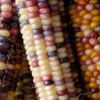Her children were understandably puzzled by that remark, and one of them couldn't contain his curiosity. "Mom," he said, "what are you talking about?"
"I remember eating with my family when I was a young girl," the woman began, "Each of us would help clear away the dishes. Every once in a while, mom would tell us, 'Save your fork!' We children knew what that meant. It meant that mom had fixed us a pie or a cake or some sort of treat. When she said 'Save your fork!' that meant the best was yet to come. So I want to be buried with a fork in my hand, for the best is yet to come!"
It's a lovely story, a beautiful illustration of hope. In Spanish, the word "esperar" means "hope," but it also means "wait." You wait for a bus, and you hope it's coming; the same word is used in both cases. It's the same in the biblical languages. Our hope is built around the expectation of something that is to come.
The apostle Paul wrote to a group of new Christians in the city of Thessalonica, talking of the reputation these Christians had. He wrote, "They tell how you turned to God from idols to serve the living and true God, and to wait for his Son from heaven" (1 Thessalonians 1:9-10). That's a beautiful description of a Christian's life: turning away from an old life, serving God and waiting for Jesus to come back. We have hope because we are waiting for someone. He will bring us something wonderful, a life without pain or sadness.










Reader Comments
Archived Facebook Comments